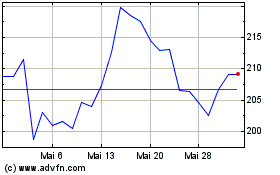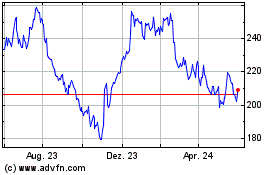Teleflex Incorporated (NYSE: TFX), a leading global provider of
medical technologies, today announced the first patient enrollment
in a clinical registry that is intended to examine and collect data
on outcomes of contemporary on-label use of the MANTA™ Vascular
Closure Device (VCD) in standard of care transcatheter aortic valve
replacement (TAVR) procedures. The registry will include
appropriate patient selection and proper vascular access.
Enrolling at least 250 patients in up to 15 major
TAVR institutions across the US and Canada, the ACCESS-MANTA™
Registry is an international, multicenter, prospective,
observational, single-arm clinical registry. It will employ the
primary objectives of safety, defined by VCD large bore access
site-related Valve Academic Research Consortium-3 (VARC-3) major
and minor vascular complications within 30 days of the TAVR
procedure, and effectiveness, defined by time to hemostasis or the
elapsed time between MANTA™ Device deployment and the first
observed and confirmed arterial hemostasis. The study will also
evaluate technical success, treatment success, ambulation success,
discharge readiness, and procedure time.
“Large bore access site complications are recognized as morbid,1
driving increased costs and prolonged length-of-stay,2” said
Teleflex Interventional Medical Director, Christopher Buller, MD.
"That is why percutaneous cardiac and peripheral procedures, such
as TAVR, that are performed through large bore arteriotomies, need
dedicated closure technology that is safe and effective as well as
procedurally efficient.”
“The MANTA™ Device demonstrated those attributes in the pivotal
SAFE MANTA IDE Clinical Trial,3” Dr. Buller added. “However, TAVR
practice has since evolved to embrace routine access site imaging,
awake procedures, somewhat smaller delivery systems and sheaths,
lower-risk patients, and considerably higher per-operator
experience. The ACCESS-MANTA™ Registry will allow us to understand
the degree to which these changes, coupled with a dedicated device
that is optimally deployed, may improve large bore outcomes.”
The study chair is George Dangas, MD, PhD, Professor of Medicine
(Cardiology), and Surgery, and the Director of Cardiovascular
Innovation at the Zena and Michael A. Wiener Cardiovascular
Institute at the Icahn School of Medicine at Mount Sinai. The
principal investigators of the study include Sahil Khera, MD,
Interventional Director of the Structural Heart Program at The
Mount Sinai Hospital, and Danny Dvir, MD, Director of
Interventional Cardiology at Shaare Zedek Hospital Center,
Jersualem.
“We are excited that Mount Sinai Medical Center is spearheading
the Teleflex ACCESS-MANTA™ Registry,” said Dr. Khera, Co-Global
Principal Investigator. “The study focuses on on-label use of the
MANTA™ Device, appropriate patient selection using pre-TAVR CT
imaging, and proper vascular access, all of which reflect the
standard practice at our world class, high-volume TAVR center. We
look forward to this contribution to the advancement of large bore
access and closure.”
About the MANTA™ Vascular Closure
Device
The MANTA™ Vascular Closure Device is the first commercially
available biomechanical vascular closure device designed
specifically for large bore femoral arterial access site closure.4
Since the first implantation in 2014, receiving its CE mark in
2016, and FDA approval in 2019, the MANTA™ Device has been well
studied in over 10,000 patients and in 70+ publications. Over
150,000 units have been sold globally.4
Available in 14 and 18 Fr. sizes, the MANTA™ Device is indicated
for closure of femoral arterial access sites while reducing time to
hemostasis following the use of 10-20 Fr. devices or sheaths (12-25
Fr. O.D.) in endovascular catheterization procedures. The
technology creates an alternative to cut down and suture-mediated
closure for large bore procedures and has proved useful in
TAVI/TAVR, EVAR/PEVAR/TEVAR, and BAV.
About Teleflex Incorporated
Teleflex is a global provider of medical technologies designed
to improve the health and quality of people’s lives. We apply
purpose driven innovation – a relentless pursuit of identifying
unmet clinical needs – to benefit patients and healthcare
providers. Our portfolio is diverse, with solutions in the fields
of vascular access, interventional cardiology and radiology,
anesthesia, emergency medicine, surgical, urology and respiratory
care. Teleflex employees worldwide are united in the understanding
that what we do every day makes a difference. For more information,
please visit teleflex.com.
Teleflex is the home of Arrow®, Deknatel®, LMA®, Pilling®,
QuikClot®, Rusch®, UroLift® and Weck® – trusted brands united by a
common sense of purpose.
Forward-Looking Statements
Any statements contained in this press release that do not
describe historical facts may constitute forward-looking
statements. Any forward-looking statements contained herein are
based on our management's current beliefs and expectations, but are
subject to a number of risks, uncertainties and changes in
circumstances, which may cause actual results or company actions to
differ materially from what is expressed or implied by these
statements. These risks and uncertainties are identified and
described in more detail in our filings with the Securities and
Exchange Commission, including our Annual Report on Form 10-K.
Teleflex, the Teleflex logo, Arrow, Deknatel, LMA, MANTA,
Pilling, QuikClot, Rusch, UroLift, and Weck are trademarks or
registered trademarks of Teleflex Incorporated or its affiliates in
the U.S. and/or other countries. Refer to the Instructions for Use
for a complete listing of the indications, contraindications,
warnings, and precautions. Information in this document is not a
substitute for the product Instructions for Use. Not all products
may be available in all countries. Please contact your local
representative. © 2023 Teleflex Incorporated. All rights reserved.
MC-009251 Rev 0.
References
1Piccolo R, Pilgrim T, Franzone A, Valgimigli M, Haynes A, Asami
M, Lanz J, Räber L, Praz F, Langhammer B, et al. Frequency, timing,
and impact of access-site and non-access-site bleeding on mortality
among patients undergoing transcatheter aortic valve
replacement. JACC Cardiovasc
Interv. 2017; 10:1436–1446. doi:
10.1016/j.jcin.2017.04.034.
2Arbel Y, Zivkovic N, Mehta D, Radhakrishnan S, Fremes SE,
Rezaei E, Cheema AN, Al-Nasser S, Finkelstein A, Wijeysundera
HC. Factors associated with length of stay following
trans-catheter aortic valve replacement - a multicenter study.
BMC Cardiovasc Disord. 2017;
17:137. doi: 10.1186/s12872-017-0573-7.
3 The SAFE MANTA IDE Clinical Trial. Study sponsored by Teleflex
Incorporated or its affiliates.
4 Data on file at Teleflex.
CAUTION: Federal (USA) law restricts these devices for sale or
use by or on the order of a physician.
Contacts:
For Teleflex Incorporated:Lawrence KeuschVice President,
Investor Relations and Strategy
Developmentinvestor.relations@teleflex.com610.948.2836
Teleflex (NYSE:TFX)
Historical Stock Chart
Von Dez 2024 bis Jan 2025

Teleflex (NYSE:TFX)
Historical Stock Chart
Von Jan 2024 bis Jan 2025
